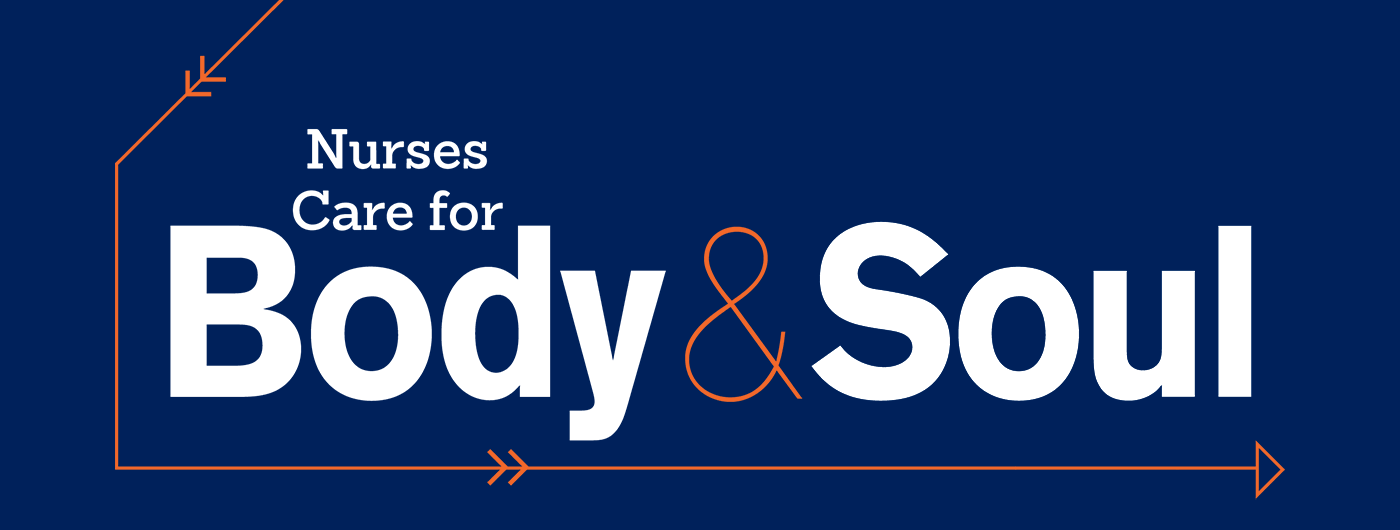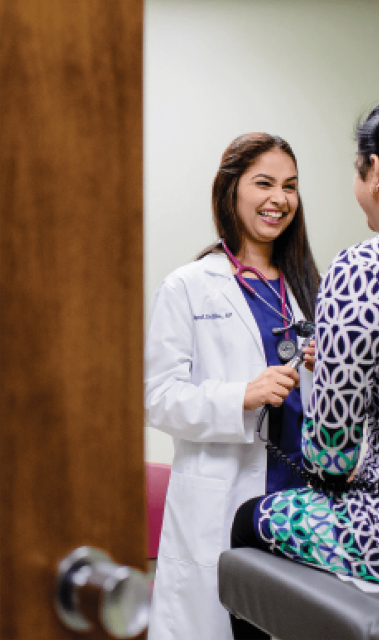 A mother lay dying in India with a wish for her young daughter.
A mother lay dying in India with a wish for her young daughter.
The woman longed for her 11-year-old to become a nurse and one day offer the same tender care she was receiving as cancer took her life.
Pritpal Sidhu (MS ’15) was that daughter, and today she works as a nurse practitioner in the Valley after earning a Master of Science in Nursing from Fresno Pacific University.
“I couldn’t really help my mom, but now at least I can help my patients,” Sidhu says. “I feel like I’m doing this for my mom and in some way I’m helping her.”
FPU’s nursing programs exemplify the university’s philosophy of serving students so they can serve others. In clinics, hospitals, schools and elsewhere, graduates fill crucial positions in a region where access to health care can be determined by ZIP Code, cultural barriers, doctor shortages, lack of insurance and other factors.
The contributions of FPU nursing graduates often occur in exam rooms or hospital rooms where patients struggle with fear and uncertainty about when—or if—they’ll regain their health. The graduates step into those moments equipped to care for body and soul.
“I have been that fearful patient; it’s what inspired me to become a nurse,” says Stacy Wise, MSN/DNP, assistant professor of nursing and director of the nursing department. “Nurses have the honor of caring for patients when they are at their most vulnerable. It is a big, but beautiful, responsibility.”
Patients and FPU graduates might begin as strangers, but the gifts of God can build trust and offer comfort. “As nurses we can be vulnerable too,” Wise says. “Sharing our faith, offering prayer—these are powerful when caring for people.”
The nursing department currently offers two degrees:
The bachelor of science degree in nursing (BSN) is for registered nurses already on the job. They start their careers by earning a one-to-two-year diploma or earning a two-year associate degree, often at community colleges, and then passing the RN licensing exam. But, they need a BSN to move into management, public health or fill other specialized positions. The program is known as RN to BSN.
The master of science degree in nursing offers an emphasis on becoming a family nurse practitioner (MSN/FNP). Students pursuing this degree already have a bachelor’s in nursing, and the master’s enables them to diagnose, treat and prescribe medicine while working with, but independent of, physicians. As doctors and patients have recognized the value of nurse practitioners, their role in health care has grown. “Extraordinary opportunities exist for nurse practitioners in the current health care climate,” says Lisa Hood, MSN/FNP program director and clinical assistant professor of nursing.
In addition, the university is exploring another option for students: the feasibility of a traditional bachelor of science degree in nursing, according to Karen Cianci, Ph.D., dean of FPU’s School of Natural Sciences. Once approved by accreditors, the program would allow students to major in nursing while completing their general education and qualify for their licensing examination as a registered nurse.
“We believe that a Fresno Pacific BSN education will prepare quality leaders for this high-need service for our Valley in the near future,” Cianci says.
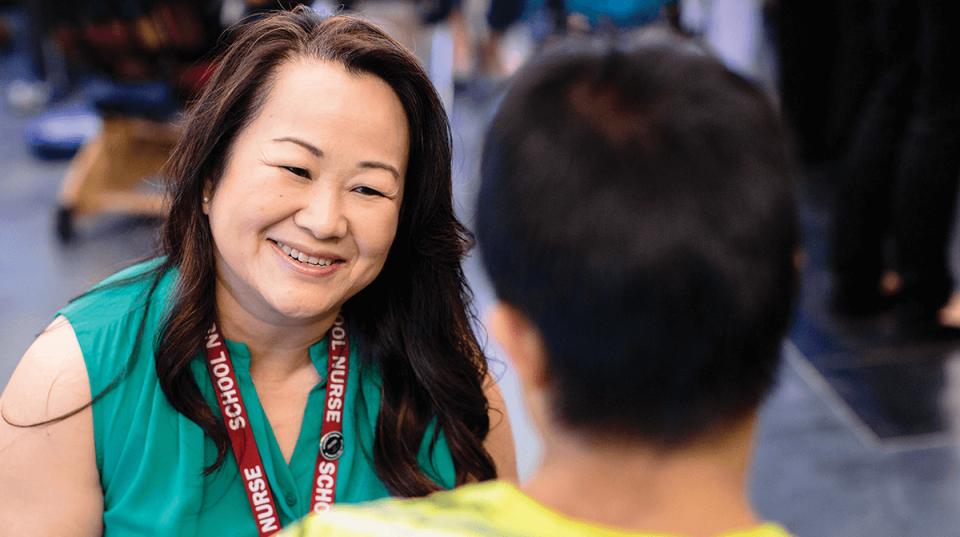
 Making a difference
Making a difference
Mee Yang-Vu (BSN ’16) came to Fresno Pacific’s nursing department because she wanted to spend more time with patients. She completed the RN to BSN program and now works as a nurse in the Clovis Unified School District.
Yang-Vu was first drawn to nursing out of a desire to help other immigrant families. Her family is Hmong and came to the United States from Laos. They had no money and no medical knowledge, which led to poor treatment by medical personnel when her father was hospitalized with a serious illness, Yang-Vu says.
“I never wanted any of my patients to experience what my family did,” she says. At the time of her father’s illness, Yang-Vu was in her 20s and planning to become a dental hygienist. Then she switched her major to nursing and was “miraculously” accepted into an impacted RN program at a community college. “I was accepted within a month. Looking back, I know that being a nurse is what God wanted me to be,” she says.
After completing a two-year program, Yang-Vu became a registered nurse and worked for more than 20 years in Fresno-area hospitals. Eventually she wanted something more. “One thing I enjoy doing as a nurse is teaching others about their medical condition,” she says. “I also value the time I spend with my patients, and it was very difficult to spend a lot of time due to the workload in the hospital.”
Not only did Yang-Vu get a BSN, but the education gave her the tools to serve her students in Clovis Unified. “I feel I am a better educator because of the knowledge I gained at FPU,” she says. “I can better explain the disease process to my patients because I have a deeper understanding of it.”
In one of her courses, Yang-Vu volunteered at Clovis East High School and saw what a school nurse does. That opportunity led to networking, which helped Yang-Vu get her CUSD job.
She serves severely disabled students at two high schools and at an education center as well as providing training for school staff. “I am more confident in how I do my presentations and research because of the education and training I received at FPU,” she says.
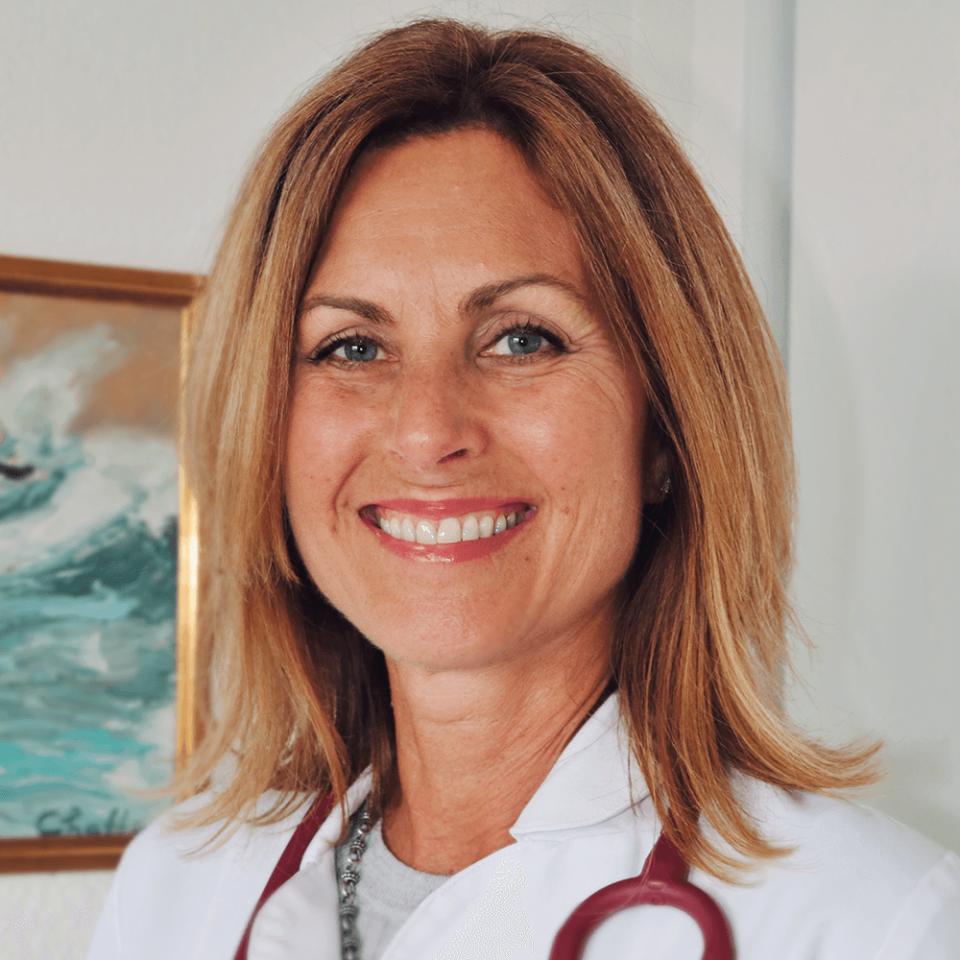
Sacred moments
Christine Burg (MSN ’15, BSN ’12) worked for 30 years as a registered nurse before attending Fresno Pacific. Today, she is a nurse practitioner in a medical practice in San Luis Obispo.
“I’ve always loved patient care, and as a nurse practitioner, I focus on treating the whole person. When I’m with a patient and they open up to me, it’s a very sacred moment,” she says.
Her work is more than a job, Burg says. “A lot of nurses think of what we do as a calling. I do.”
Early in her career, Burg jumped into the high-stress world of the intensive care unit (ICU) at Fresno’s Valley Medical Center. “It was a crazy but wonderful environment,” she says. “You’re constantly learning. I loved it.” That attitude would serve Burg well at FPU.
Through the years, she worked at other Fresno-area hospitals in the ICU and in pre-op, but she eventually wanted more responsibility. “I wanted to transition from a supportive role to a leadership role. I wanted a role where I could affect changes,” Burg says.
Becoming a nurse practitioner would allow that, but it meant returning to school after three decades to get both a bachelor’s degree and a master’s degree. At age 20, she’d become a registered nurse through a two-year program.
Burg enrolled in the RN to BSN program, where professors guided her in two daunting catch-up courses (chemistry and statistics) plus the regular curriculum. “The professors made it possible for me,” she says. “They have a heart for students. It’s very evident.”
In earning a BSN, Burg and her classmates met the requirements of the California Board of Registered Nurses to apply for public health nurse certification. That’s important because the duties of public health nurses include promoting wellness as well as identifying, treating and containing infectious diseases.
Other real-life advantages accrue to registered nurses with a BSN, says Wise, who also directs the RN to BSN program. Hospitalized patients do better and have lower mortality rates, according to research. One explanation is that BSN course work enables nurses to learn more about the social, cultural and economic issues that can affect patients and their care, according to Wise.
Community of learners
Because Fresno Pacific gears its programs to working nurses, Burg was able to keep working while pursuing both the BSN and the MSN/FNP. Classes are offered one day a week at the North Fresno Campus near Woodward Park. Small groups of students go through the course sequences together, allowing for tight bonds and building on the concept of Christian community.
In pursuing the master’s degree, Burg researched and wrote a paper exploring how workplace stress caused by disrespectful behavior can potentially affect patient care in a negative way. After graduating, she presented an abstract of her paper at a conference in Germany, where she and her husband were visiting. “Some of the people at the conference were true world changers,” she says. “It was a delight to present my paper.”
Meanwhile, Burg treasures those “sacred moments” when patients confide in her. In one case, a woman who had recently retired said the transition had left her feeling stressed. Burg concluded this indicated depression, and she suggested the woman would benefit from medication and talk therapy. The woman eventually returned and thanked Burg with a simple but profound acknowledgement: “You heard me.”
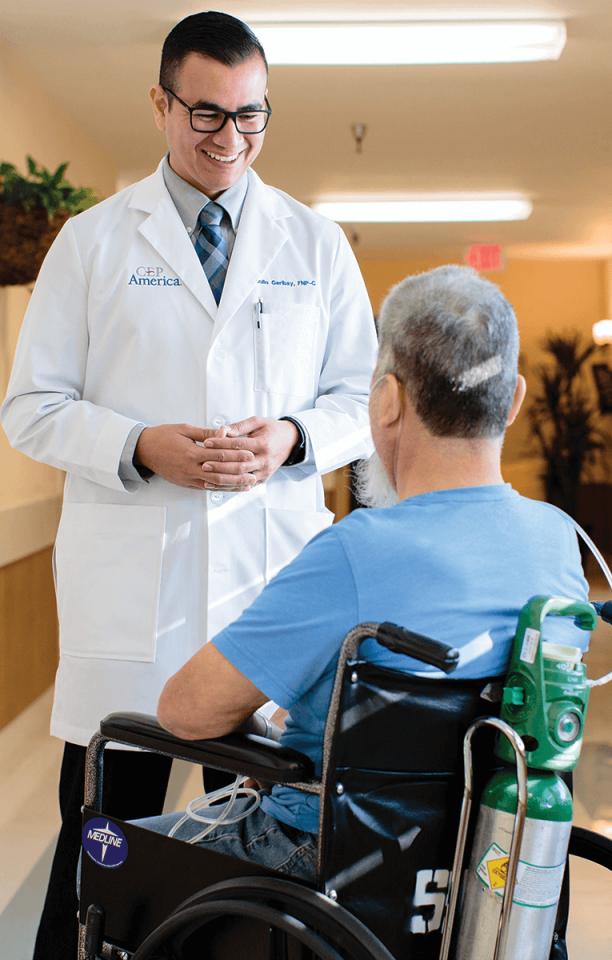
Love of God
Julio Garibay (MS ’16) found his calling to save lives when he was a teenage lifeguard. He became a medic in the U.S. Air Force, a registered nurse at hospitals in Fresno and Clovis and now nurse practitioner at a Fresno nursing home where people rehabilitate after surgery and other hospitalizations. At Fresno Pacific, where he earned the MSN/FNP, Garibay found the combination of science and soul care that he wants to share with his patients.
“I wanted more than knowledge to perform my job,” he says. “The love of God is truly the best source of medicine, as you cannot heal the body without healing the mind and one’s spiritual being.”
Sometimes, showing the love of God means taking time to explain to patients what other medical personnel have not discussed. Information can help relieve patients’ fear and frustration, Garibay says.
He did that for a woman with diabetes at an Adventist Health clinic in Kerman, where he first worked as a nurse practitioner. A year after being diagnosed as a diabetic, the woman did not understand why she needed to take her medication or why she needed regular blood work. “Nobody had explained to her in detail how the medication worked,” Garibay says. The fact that he could talk to the woman in Spanish made all the difference in this case.
In his current job at Sierra Vista Healthcare Center, he helped a man and his family who did not understand the treatment for the man’s enlarged prostate. Garibay not only provided information but made an appointment so the man could see a urologist.
Doing that kind of follow-up is why Garibay became a nurse practitioner. “I wanted to have more control over patients’ overall care. I’m doing more for patients and giving them the care that they deserve,” he says.
Giving thanks
Pritpal Sidhu—whose mother inspired her to become a nurse—begins and ends each day with a prayer. Sidhu is a Sikh, and she values that FPU is Christ-centered and appreciates how the university’s Christian philosophy influences instruction.
“Everyone was so helpful, and it was like a family. Everyone was so nice. I didn’t feel like I was thrown into the master’s program and was drowning,” she says.
Sidhu works at an Adventist Health clinic in Selma, and she’s like many people who enroll in FPU’s nursing program. “Our nurses want to give back to their patients and communities with a higher level of practice,” says FPU’s Hood.
One day, Sidhu saw a patient with diabetes who had an ulcerated foot. The woman said she had sought help in the past from other medical professionals, but her foot didn’t heal.
Looking at an old X-ray of the woman’s foot, Sidhu didn’t like what she saw and ordered an MRI. That diagnostic tool confirmed that the woman had osteomyelitis, an infection of the bone that left untreated could have led to amputation. The woman entered the hospital for treatment, and she later returned to the clinic to thank Sidhu.
“I felt so good,” Sidhu says. And she gives her own thanks for the opportunity to help people. “I believe God held my hand when he took me to the nurse practitioner program, and he will take me through this job,” she says. “I think my mother would be happy.”

